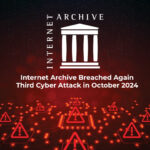Internet Archive Breached Again—Third Cyber Attack in October 2024
🎧 Listen to Our Podcast on Your Favorite Platforms! 🎧
Subscribe: Youtube | Spotify | Amazon
In a troubling series of events, the Internet Archive has confirmed its third security breach in October 2024, marking a significant escalation in the attacks targeting the nonprofit digital library. The most recent breach, disclosed on October 20, 2024, occurred when hackers exploited unrotated Zendesk API tokens to access sensitive data through the platform that manages the Archive’s support tickets.
The Internet Archive, renowned for its Wayback Machine and vast digital collections, is struggling to recover from these relentless cyberattacks. Despite previous warnings and two major breaches earlier this month, the organization was unable to secure its systems adequately, allowing attackers to access and potentially download personal identification documents submitted by users. These documents were part of support tickets dating back to 2018, some of which contained requests for the removal of sensitive content from the Archive’s services.
A Timeline of the October Attacks
The latest breach follows a pattern of increasing cyberattacks throughout October 2024, each one building upon vulnerabilities left unaddressed by the previous incidents.
October 9, 2024: The First Breach
The first major breach, reported on October 9, 2024, involved a two-pronged attack: a data breach and a Distributed Denial of Service (DDoS) assault. Hackers exploited a GitLab token, which had been exposed since late 2022, to infiltrate the Archive’s source code and steal sensitive user data. This breach affected 31 million users, exposing email addresses, Bcrypt-hashed passwords, and other private information.
While hackers accessed the data, a separate group called SN_BlackMeta launched a DDoS attack, overloading the Internet Archive’s servers and temporarily taking the site offline. Although both incidents happened concurrently, they were executed by different groups, each targeting separate vulnerabilities in the Archive’s infrastructure.
Mid-October 2024: The Second Breach
Barely recovering from the first breach, the Internet Archive was hit again in mid-October 2024. This time, hackers gained unauthorized access to the Archive’s Zendesk support platform, exploiting unrotated API tokens that had been exposed in the first attack. These tokens, essentially digital keys, are used to authenticate access to services. However, the Archive had failed to rotate these keys after the initial breach, leaving them vulnerable to further exploitation.
The attackers accessed thousands of support tickets dating back six years, which included personal identification documents from users. This breach highlighted critical flaws in the Archive’s security practices, particularly its token management and rotation policies.
October 20, 2024: The Third and Most Recent Breach
On October 20, 2024, hackers struck again by continuing to exploit the same unrotated Zendesk API tokens used in the second breach. The failure to address these vulnerabilities allowed attackers to maintain persistent access to sensitive user data stored on the support platform. Once again, the breach involved the potential exposure of personal identification documents, underscoring the cumulative impact of these attacks on the Archive’s security infrastructure.
Compounding Vulnerabilities
The series of attacks in October 2024 can be traced back to the initial breach on October 9, which exposed significant weaknesses in the Archive’s security protocols. The following factors contributed to the compounding damage:
- Unsecured Tokens: Both the GitLab and Zendesk tokens were left unrotated and unprotected, allowing hackers to repeatedly exploit the same entry points. In cybersecurity, rotating access tokens after a breach is critical to preventing further exploitation, but this essential step was missed.
- Lack of Adequate Response: Despite the Archive’s awareness of the vulnerabilities, it failed to implement a timely response to secure its systems. The hackers exploited these shortcomings in each subsequent attack, demonstrating the organization’s inability to safeguard its digital assets.
- Data Exposure: The data accessed during these breaches included sensitive user information such as email addresses, passwords (albeit hashed), and personal identification documents. This raises concerns about potential identity theft and phishing schemes, as the stolen data could be used in malicious ways.
Why Was the Internet Archive Targeted?
The Internet Archive, as a prominent nonprofit dedicated to preserving digital history, represents a high-profile target for hackers seeking to make a name for themselves in underground communities. Although no ransom demands have been reported, the motivation behind these breaches seems to be rooted in the desire for “cyber street cred,” where attackers earn prestige by successfully breaching well-known organizations and leaking significant amounts of data.
Given its role in maintaining the world’s largest digital archive, the Internet Archive holds vast amounts of valuable data. From websites archived in the Wayback Machine to millions of digital books, music files, and videos, the Archive plays a crucial role in preserving the digital record for future generations. As such, a successful attack on its infrastructure carries significant weight in hacker circles.
Official Response and Support from the Community
At the time of writing, the Internet Archive has not released an official statement regarding the most recent breach. However, on October 19, its official X (formerly Twitter) account posted a brief acknowledgment of the ongoing attacks. In response, a movement of solidarity has grown online, with users tweeting the phrase “I stand with @internetarchive” to show support for the organization’s mission and its ongoing efforts to preserve digital history.
Here’s an insider report on what’s going on behind the scenes to bring @internetarchive services online: https://t.co/HKhlmbrYUO pic.twitter.com/eCMlYBPDQb
— Internet Archive (@internetarchive) October 19, 2024
The Internet Archive remains a vital resource for researchers, historians, and the general public. Since its founding in 1996, the Archive has amassed over 150 billion web pages, millions of digital books, videos, and software files. Despite the recent security setbacks, the organization continues to operate, relying heavily on donations to maintain its services and ensure free access to knowledge for all.
Future Outlook: Will the Archive Recover?
The Internet Archive continues to be an essential resource for researchers, historians, and the wider public. Rotating access tokens, improving encryption, and investing in a more robust cybersecurity infrastructure are all critical steps the organization must take to prevent future breaches. Furthermore, transparency with its user base about the full extent of the damage and the steps being taken to protect their data will be essential in restoring trust.
As the Internet Archive works to patch the vulnerabilities exploited in these breaches, the broader cybersecurity community may offer assistance to help the Archive shore up its defenses. With the support of digital rights advocates and loyal users, the Archive has the potential to rebound from these attacks and continue its vital mission.
FAQs:
- What occurred at the Internet Archive in October 2024?
- The Internet Archive suffered three major cyberattacks in October 2024. Hackers exploited unrotated API tokens to access sensitive data stored on the Archive’s Zendesk support platform. These breaches exposed personal information, including personal identification documents submitted by users. The attacks followed an initial breach on October 9, which exposed 31 million users’ data.
- How were the hackers able to breach the Internet Archive multiple times?
- The hackers exploited unrotated Zendesk and GitLab API tokens, which act as digital keys to access internal systems. The Archive failed to rotate or replace these tokens after the first attack, leaving them vulnerable. This allowed attackers to reuse the same entry points for each subsequent breach.
- What kind of data was compromised in the breaches?
- The data compromised includes Bcrypt-hashed passwords, email addresses, and personal identification documents submitted by users through the support ticket system. This sensitive data could be used for phishing schemes or identity theft.
- What is an API token, and why is it important to rotate it?
- An API token is a digital key used to grant access to certain services or applications. Rotating these tokens regularly ensures that if one is compromised, it can’t be reused for unauthorized access. The Internet Archive’s failure to rotate its API tokens allowed attackers to breach its systems multiple times.
- Was the Wayback Machine affected by these attacks?
- There is no indication that the Wayback Machine, which archives websites, was directly compromised by these attacks. However, the breaches targeted the Internet Archive’s internal systems and support platform, raising concerns about the organization’s overall security.
- Is the Internet Archive safe to use now?
- The Internet Archive is still operational, but given the recent breaches, users are advised to remain cautious and monitor for updates on security measures being implemented by the organization. Users should also ensure their personal information, such as passwords, is secure by changing credentials that may have been affected.
How Technijian Can Help
In the wake of the Internet Archive’s multiple breaches, Technijian offers comprehensive cybersecurity solutions designed to safeguard organizations from similar vulnerabilities. With expertise in preventing cyberattacks and securing sensitive data, Technijian can help protect your business or nonprofit from a range of threats. Here’s how:
1. API Token Management and Rotation
Technijian specializes in implementing robust token management systems to prevent unauthorized access. We ensure that API tokens are regularly rotated and protected, reducing the risk of repeat breaches similar to those that affected the Internet Archive.
2. Cybersecurity Audits
We perform in-depth security audits to identify weaknesses in your systems. Our experts analyze access control mechanisms, token policies, and encryption practices to close any gaps that hackers could exploit.
3. 24/7 Monitoring and Incident Response
Technijian offers round-the-clock monitoring of your systems to detect potential breaches in real time. In case of an attack, our incident response team is ready to act swiftly, minimizing damage and recovering compromised systems.
4. Data Encryption and Protection
We implement advanced encryption protocols to ensure that sensitive user data is securely stored and transmitted. Technijian’s encryption solutions make it harder for hackers to access and use stolen data, even if a breach occurs.
5. DDoS Attack Prevention
Technijian deploys anti-DDoS strategies to shield your servers from overwhelming traffic surges caused by attackers. Our services ensure that your website remains operational, even under heavy attack, protecting your reputation and service availability.
6. Employee Training and Phishing Prevention
Most cyberattacks start with human error. Technijian offers cybersecurity awareness training for employees, helping them recognize and avoid phishing attacks. This training is vital for preventing data breaches caused by social engineering tactics.
7. Customized Security Solutions
Every organization has unique security needs. Technijian tailors its cybersecurity services to fit your specific requirements, whether you’re a nonprofit like the Internet Archive or a large enterprise. Our solutions ensure comprehensive protection against modern cyber threats.
By partnering with Technijian, organizations can strengthen their cybersecurity infrastructure and avoid the devastating consequences of data breaches like those experienced by the Internet Archive.
About Technijian
Technijian is a premier provider of managed IT services in Orange County, delivering top-tier IT solutions designed to empower businesses to thrive in today’s fast-paced digital landscape. With a focus on reliability, security, and efficiency, we specialize in offering IT services that are tailored to meet the unique needs of businesses across Irvine, Anaheim, Riverside, San Bernardino, and Orange County.
Located in the heart of Irvine, Technijian has earned a reputation as a trusted managed service provider in Irvine for businesses seeking robust IT support. Our dedicated team of IT experts ensures that your technology infrastructure is always optimized, secure, and aligned with your business goals. Whether you require IT support in Irvine, IT support in Orange County, managed IT services in Irvine, or IT services in Orange County, we’ve got you covered. Our expertise also extends to providing managed IT services in Anaheim, IT support in Riverside, and IT consultant services in San Diego.
As a leader in IT support in Orange County, we understand the challenges businesses face when maintaining and advancing their IT environments. That’s why our comprehensive suite of services includes IT infrastructure management, IT support in Anaheim, IT help desk, and IT outsourcing services. With proactive monitoring, disaster recovery, and strategic consulting, our goal is to minimize downtime, enhance productivity, and provide IT security services that give you peace of mind.
At Technijian, we take pride in offering customized managed IT solutions that exceed client expectations. From small businesses to large enterprises, our IT services in Irvine are designed to scale with your needs and support your growth. We specialize in cloud services, IT systems management, business IT support, technology support services, IT network management, and enterprise IT support. Whether you’re looking for IT support in Riverside, IT solutions in San Diego, or managed services in Orange County, Technijian has the expertise to meet your requirements.
Our managed service providers in Orange County offer comprehensive solutions for every business need. Whether you need help with IT performance optimization, IT service management, or IT security solutions, we provide services that enable businesses to remain agile in today’s competitive market. Our IT support services in Orange County and managed IT services in Irvine ensure your operations remain secure, productive, and future-ready.
We also offer managed service provider services and IT support in Irvine, CA, focusing on delivering efficient and scalable IT services across Southern California. Technijian is committed to providing IT managed services in Irvine, IT support in Anaheim, and IT services in Orange County, CA that adapt to the ever-changing demands of business technology.
Experience the difference with Technijian—your trusted partner for IT consulting services, managed IT services, and IT support in Orange County. Let us guide you through the complexities of modern IT infrastructure and help you achieve your business objectives with confidence.






